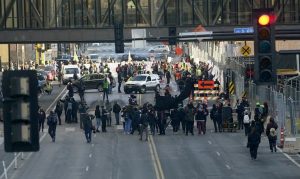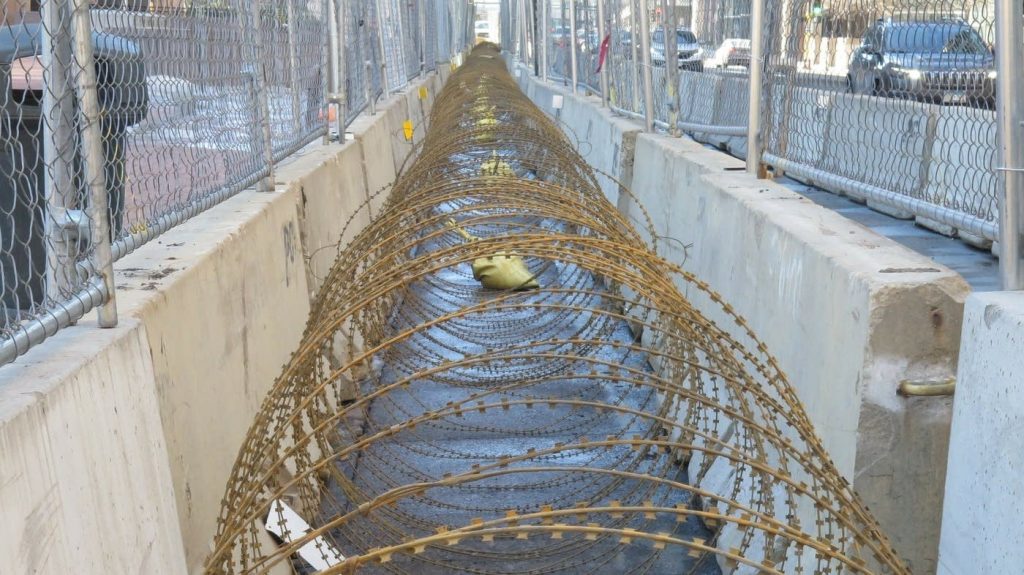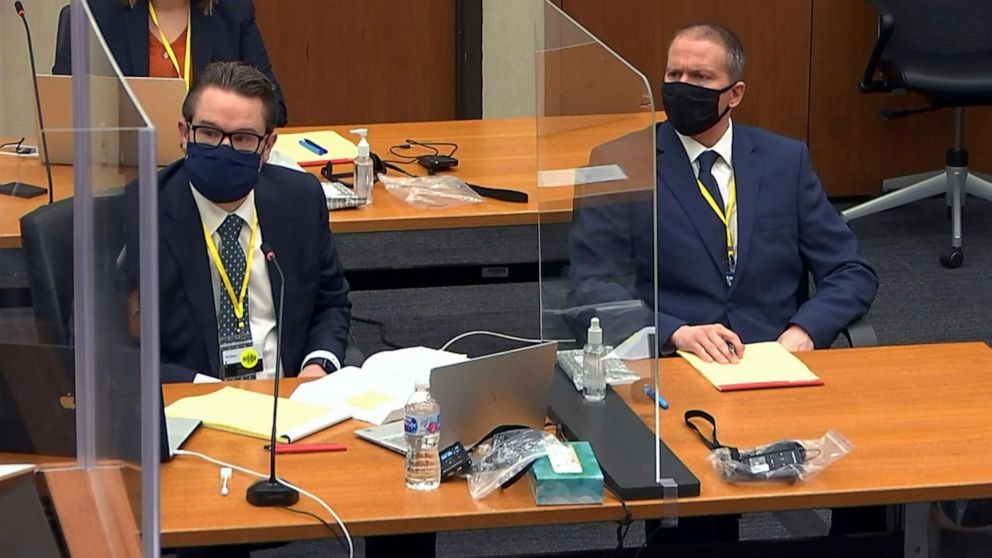The trial of Derek Chauvin in the death of George Floyd began Monday with Chauvin's defense attorney, Eric Nelson, telling the court he will file a petition for the Minnesota Supreme Court to review a Court of Appeals decision issued on Friday which asked Hennepin County District Court Judge Peter Cahill, who is presiding over Chauvin's case, to consider reinstating a third-degree murder charge against Chauvin. Judge Peter Cahill had dismissed the third-degree murder charge last October, finding that it required evidence that Chauvin's alleged actions put multiple people at risk and resulted in a death. Cahill ruled that since Chauvin is accused of only targeting Floyd, the count did not apply to his case.
The Court of Appeals move to ask Judge Cahill to reinstate the third-degree murder charge stemmed from its Feb. 1 ruling upholding a third-degree murder conviction against former Minneapolis police officer Mohamed Noor in the 2017 fatal shooting of Justine Ruszczyk Damond.
For the prosecution, State prosecutor Matthew Frank asked that Cahill put jury selection on hold in light of the defense petition regarding the additional charge, stating “we won't know exactly what the charges are if we now go forward and start picking the jury, so this court would be making decisions about jurors for a trial about which we don't know what the exact charges are going to be yet.” Responding, Chauvin’s lawyer, Eric Nelson, argued that there was no need to delay jury selection while waiting for the Supreme Court to review the Court of Appeals ruling on third-degree murder.
Judge Cahill refused to halt jury selection, so Frank informed the court he would file a motion with the appellate court for further direction about whether jury selection can go ahead, as they await a decision on whether to allow the third-degree charge from the state Supreme Court. Judge Cahill then ruled to hold the jury selection until at least Tuesday, allowing the prosecution time to file their request. Chauvin is currently facing second-degree murder and second-degree manslaughter charges.
 DAVID JOLES, STAR TRIBUNE
DAVID JOLES, STAR TRIBUNE
While this took place in the courtroom, thousands of protesters continued to demonstrate on the streets of Minneapolis. On Sunday, protesters had walked behind a replica coffin covered in red roses, with people chanting 'No Justice, No Peace' on their way through the city. Their presence is set to continue for the duration of proceedings.
In scenes that might be likened to those found in John Grisham's books, lawyers will aim to select jurors who have not made up their minds and can commit to adjudicating independently. Even though the death was highly publicized, it is expected to about three weeks if it starts Tuesday, with formal arguments beginning March 29.
The City Prepares
Minneapolis has taken action to meet anticipated unrest around the trial by bringing in up to 2,000 National Guard members and 1,100 other law enforcement officers to patrol streets. The courthouse has been furnished with concrete barriers and barbed-wire fencing. Protesters fear that Chauvin will escape penalties, bringing a heightened level of protest in its wake. 43-year-old Billie Jean Van Knight told the Agence France-Presse news agency, “I hope that our legal system allows all evidence to be presented and that we get a conviction, but I don't expect it.”
 Concertina wire sits between a double row of concrete barricades topped with chain-link fencing along Third Avenue South outside the Hennepin County Government Center late last month. Matt Sepic | MPR News
Concertina wire sits between a double row of concrete barricades topped with chain-link fencing along Third Avenue South outside the Hennepin County Government Center late last month. Matt Sepic | MPR News
Chauvin's case has the potential to be extraordinary: featuring star attorneys, being held under tight security, and being live-streamed. It will also be intensely watched as a potential marker of change in America which has seen an unprecedented amount of racial protest and activism in line with the Black Lives Matter movement.
Speaking about the testimony that will come, Benjamin Crump, a prominent civil rights attorney representing the Floyd family, said on “This Week” Sunday that “you look at the video, and you hear him say 28 times, ‘I can't breathe.’” People are begging the police to remove the knee from his neck, “They say his nose is bleeding; he can't breathe; he is going unconscious—you're going to kill him.”
For the prosecution, the Minnesota attorney general's office is using Neal Katyal, a former U.S. acting solicitor general whose legal career has taken him to argue cases before the Supreme Court. While speculating about the possible outcome, former policewoman, and advisor on police practices, Ashley Heiberger, says, “the fact that a police officer has been charged criminally for an abusive use of force, that in and of itself is an outlier. It's even rarer for them to be convicted.” She also noted, however, the unique situation in which Chauvin’s actions are deemed so egregious “no police officers or police organizations came out and defended his action.” The other police officers involved in Floyd's arrest -- Alexander Kueng, Thomas Lane, and Tou Thao—face lesser charges and will be tried separately. All four were fired by the Minneapolis Police Department after Floyd’s death.
Eric Nelson, the lawyer for Chauvin, contends that his client “acted according to Minneapolis Police Dept. policy, his training and within his duties as a licensed peace officer of the State of Minnesota. He did exactly as he was trained to do.”
Previously, Nelson argued that it was not his client’s fault Floyd died—the burden was on the other rookie cops who he said should have called an ambulance sooner or “chosen to de-escalate” the situation. “If EMS had arrived just three minutes sooner, Mr. Floyd may have survived. If Kueng and Lane had chosen to de-escalate instead of struggle, Mr. Floyd may have survived. If Kueng and Lane had recognized the apparent signs of an opioid overdose and rendered aid, such as administering naloxone, Mr. Floyd may have survived,” Nelson said in previous court hearings.
 Former Minneapolis police officer Derek Chauvin, right, and his defense attorney, Eric Nelson, listen to Hennepin County Judge Peter Cahill at the Hennepin County Courthouse in Minneapolis, March 8, 2021/ABC News.
Former Minneapolis police officer Derek Chauvin, right, and his defense attorney, Eric Nelson, listen to Hennepin County Judge Peter Cahill at the Hennepin County Courthouse in Minneapolis, March 8, 2021/ABC News.
A conviction for Chauvin will need a unanimous verdict by the 12-member jury. Whereas a hung jury could mean another summer of anti-racism demonstration. To vet potential jurors, they will need to answer a 16-page questionnaire, with questions including:
- “How favorable or unfavorable are you about Black Lives Matter?”
- “Have you ever watched videos of George Floyd's death? If yes, how many times?”
Ongoing social distancing measures due to covid-19 means that the Floyd and Chauvin families will only be allowed one seat per day. Only two reporters are allowed in each day, with the rest of the media watching monitors from a nearby building.
The verdict is not expected until late April.


